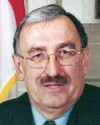Mr. Speaker, the referendum campaign is off and running.
The odds are strong that the PQ government will be tempted to use public funds in the coming months to promote Quebec's separation from the rest of Canada.
Quebec would still face a period of political instability with consequent economic repercussions. Separatists will be sending unsettling messages to possible investors.
But Quebeckers will not fall for these PQ tricks. They will be able to distinguish between the messages of separation sent by the PQ over the next few months and the federal government's call for co-operation in improving the Canadian federation.















